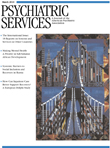News Briefs
Call for applications for the 2010 Psychiatric Services Achievement Awards: Innovative programs that deliver services to people with mental illness or mental disabilities, that have overcome obstacles, and that can serve as models for other programs are invited to enter the 2010 Psychiatric Services Achievement Awards competition. Two Gold Achievement Award winners will be chosen—an academically or institutionally sponsored program and a community-based program. The Gold Award winners will each receive $10,000. Second- and third-place winners will receive awards of $7,500 and $5,000, respectively. Funds for the 2010 American Psychiatric Association's Achievement Awards program have been provided by Pfizer, Inc. The application deadline is March 31. More information about the awards, including links to descriptions of last year's winning programs, and the application can be found on APA's Web site at www.psych.org/achievementawards . Potential applicants with questions are invited to call the Awards Program office at 703-907-8592.
TANF funds available for families in need of short-term treatment services: The Administration for Children and Families (ACF) and Substance Abuse and Mental Health Services Administration are reminding states that Temporary Assistance for Needy Families (TANF) funds can be used to help families in need of short-term mental health or substance use treatment services. The grant notification (TANF-ACF-PI-2009-12) includes an explanation of how resources under the TANF Emergency Fund—a provision of the American Recovery and Reinvestment Act—can be used to support such services. The TANF block grant provides states and tribes with federal funds and wide flexibility to provide time-limited assistance, employment services for parents, and other specialized services, including mental health and substance abuse services, for struggling families. For example, a jurisdiction can use federal TANF funds to provide counseling services, such as mental health services, anger management counseling, and nonmedical substance abuse treatment services to family members with barriers to employment and self-sufficiency. The guidelines are available on the ACF Web site at www.acf.hhs.gov/programs/ofa .
Comments on DSM-5 draft criteria invited: The fifth edition of the Diagnostic and Statistical Manual of Mental Disorders is scheduled for publication in May 2013. As part of the development process, the preliminary draft revisions to the current diagnostic criteria for psychiatric diagnoses that have been proposed by the American Psychiatric Association's (APA's) DSM-5 Work Groups are now available online ( www.dsm5.org ) for review. Public comments are invited until April 20, and the criteria will be reviewed and refined over the next two years. During this time, APA will conduct three phases of field trials to test some of the proposed criteria in real-world clinical settings. When the draft criteria were released, the National Alliance on Mental Illness (NAMI) issued a press release calling on individuals and families affected by mental illness to review the criteria and submit comments on the APA site. NAMI has also created a discussion site for NAMI members and others to post feedback ( www.nami.org/discussion/dsmv ).
New AHRQ database of comparative effectiveness research grant awards: The Agency for Healthcare Research and Quality (AHRQ) has created a database of awards for comparative effectiveness research ( www.effectivehealthcare.ahrq.gov ). The information is presented as it appeared on the submitter's grant application. Database searches can be filtered by 11 specific health topics, including mental health. The Web site of AHRQ's Effective Health Care Program also invites visitors to comment on draft research reports, submit scientific information packets and suggestions for research, and sign up for e-mail announcements by professional interest and health condition. Definitions of key terms are provided, and the processes of conducting comparative effectiveness research and reviews are described. AHRQ is the lead federal agency charged with improving the quality, safety, efficiency, and effectiveness of health care for Americans.
Bazelon Center analysis of proposed 2011 budget: The current edition of Mental Health Policy Reporter, the online newsletter of the Bazelon Center for Mental Health Law, examines President Obama's proposed appropriations for mental health care in the 2011 budget and concludes, "If its freezes, cuts, and increases were enacted as submitted (never happens), children and adults with mental disabilities would win some and lose a little." Under the proposed three-year freeze for non-security-related domestic discretionary spending, programs would not be subjected to across-the-board cuts; however, many would be cut, eliminated, consolidated, or funded at 2010 levels, while others would receive increases. The budget proposes a $110 million increase for the Substance Abuse and Mental Health Services Administration, which includes a $23 million increase for programs administered by the Center for Mental Health Services—specifically for children's services and programs for the homeless population. The proposal includes an additional $25.5 billion in Medicaid funding for states, which would extend by six months (through June 2011) the increase in federal matching funds provided in the American Recovery and Investment Act of 2009. The proposal also continues reentry investments in the Second Chance Act by providing $100 million in 2011. The Second Chance Act is targeted to reduce recidivism by offenders reentering society from incarceration through access to job training, mental health counseling, and other services and supports. The full analysis is available at www.bazelon.org/newsroom/reporter .



